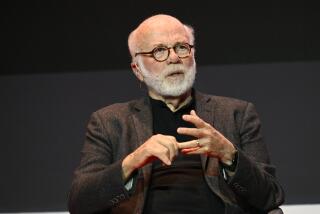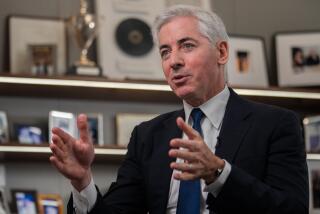CEO Assets Now a Debit for Cheney
- Share via
WASHINGTON — When Dick Cheney left the private sector in August 2000 to become George W. Bush’s running mate, it looked as if everyone involved would be coming out ahead.
As chief executive of Halliburton Co., Cheney had transformed a second-tier oilfield services firm into the industry’s biggest player. The Bush campaign regarded Cheney’s corporate credentials as an important election-year asset. Halliburton was on a roll, and its shareholders were reaping the benefits--including Cheney, who cashed in stock and options worth more than $30 million on his way to the White House. It was, in his words, “a great success story.”
Two years later, it appears only Cheney is still showing a profit.
The Securities and Exchange Commission is looking into possible accounting irregularities at Halliburton during the Cheney years. A 1998 corporate acquisition orchestrated by Cheney has exposed the Dallas-based company to huge asbestos liabilities. Halliburton’s stock has plummeted 76% since Cheney sold his shares, erasing all of the gains recorded during his tenure and collapsing the company’s market value from $24 billion to $6 billion.
The dark cloud hovering over the company appears to be undermining the White House’s credibility in responding to the rash of accounting scandals and other corporate misdeeds.
To be sure, the stock sales that made Cheney a very wealthy man appear to have been dictated largely by the need to divest his stake in the company before assuming office in January 2001. And the jury is still out on whether there was anything improper about the accounting maneuvers being reviewed by the SEC.
But Cheney seems to share one defining characteristic of ex-CEOs whose actions are now under intense scrutiny: He became a millionaire many times over by cashing in his stock options before problems came to light and ordinary shareholders began losing their shirts.
“Cheney is a microcosm of the challenge that this White House faces on corporate accountability,” said Kim Wallace, chief political analyst for Lehman Bros., a Wall Street securities firm.
The vice president is one of several Bush Cabinet members and White House officials who came to the administration from corporate America, and who sold their stakes near the stock market’s peak. They may have had little choice in the matter, but the windfalls they enjoyed, and their seeming tardiness in pushing for crackdowns on corporate wrongdoing, now are viewed with suspicion.
“It’s clear that a majority of Americans believe the administration is too close to big business,” Wallace said. “That makes it difficult for the White House to know which of these guys to put in front of the camera to try to restore confidence.... Let’s face it, the White House is on the run on this.”
Some speculate that if the SEC inquiry finds that Halliburton acted improperly, Cheney might become one of the first political casualties of the corporate accounting scandals.
“I think there’s going to be a push at some point to say, ‘Look, we need to do something about Cheney,’ ” said Paul C. Light, director of governmental studies at the Brookings Institution, a centrist think tank in Washington. “That may come sooner rather than later.”
Cheney’s press secretary, Jennifer Millerwise, declined to comment concerning Cheney’s record at Halliburton. “The office of the vice president is not and cannot work on Halliburton issues,” Millerwise said. “This is a matter pending before the SEC, and it would be inappropriate for the vice president or our office to comment on the specifics of an SEC inquiry.” Millerwise said Cheney has not been contacted by SEC officials.
The vice president’s defenders say it is unfair to blame Cheney for all of the problems at Halliburton, though he served as CEO, president and chairman of the board. They say he delegated day-to-day management details to subordinates and could not have foreseen the full extent of Halliburton’s future calamities when he resigned from the board Aug. 16, 2000.
As Halliburton’s CEO, company spokeswoman Wendy Hall said, Cheney assumed a “make-it-happen” role and left it to others to implement decisions.
Nor is it fair, supporters say, to suggest that Cheney sold his Halliburton stock when he did because he knew trouble was looming. He was under intense political pressure to sell his Halliburton holdings before the November 2000 presidential election, and company officials say he acted within a limited legal “window” in which he could sell shares without violating insider-trading rules.
Did Cheney’s management of the company contribute to the dramatic decline in the price of its shares? If so, it would call into question his competence as a CEO, and thus whether he should have been so richly rewarded.
Some of Halliburton’s stock swoon since Cheney’s departure can be attributed to broader market declines. The S&P; 500 index has tumbled 42% since Cheney left Halliburton; an index of 16 oil service firms has fallen 43%.
But industry analysts attribute as much as a third of Halliburton’s market decline to events that began to unfold while Cheney was in charge but didn’t surface until he left.
About two months after Cheney sold his Halliburton stock, the company announced that its Brown & Root Services subsidiary had been sued for allegedly overbilling the Army for work done at Ft. Ord, Calif. About the same time, it warned analysts that costs were rising and new orders were declining in its engineering and construction units. Halliburton stock headed south, falling to $36 by year’s end.
Acquisition a Nightmare
More damaging was the company’s 1998 acquisition of cross-town rival Dresser Industries.
Cheney was instrumental in arranging the $7.7-billion merger, which catapulted Halliburton from fourth to first place in oilfield services. But along with Dresser’s oil patch operations, Halliburton inherited the legal liability for an asbestos brick-making business Dresser had sold to another company six years earlier. The new owner went bankrupt, and attorneys representing former employees began aiming asbestos-related injury claims at Halliburton.
Concerns about asbestos exposure reached a crescendo in December 2001, when Halliburton was socked with several multimillion-dollar damage awards. After months of insisting that its liability was relatively small, Halliburton announced Wednesday it is setting aside $391 million to pay asbestos-related claims. The litigation charge was the biggest factor in the $498-million loss it recorded for the second quarter.
Fred Mutalibov, an industry analyst for SWS Securities in Dallas, said he thinks Halliburton stock, which closed Friday at $12.98 a share, would be trading for about $26 if investors valued it as they do other oilfield service firms. Of the $13 difference, he attributes all but a dollar or two to the asbestos problem.
“Clearly, what’s depressing Halliburton stock is the asbestos issue,” Mutalibov said. “I don’t think the SEC investigation has much to do with the stock price decline.”
Cheney’s defenders say the company exercised proper caution in assessing its liabilities before proceeding with the Dresser acquisition, and that no CEO could have anticipated the sequence of events that left Halliburton holding the bag for a much bigger asbestos liability than anyone anticipated four years ago. Although the company knew it would have some legal vulnerability after acquiring Dresser, it believed it had accurately projected the potential liability and had adequate insurance to cover any claims it might incur.
“In hindsight, I’m sure Mr. Cheney wishes he wouldn’t have bought Dresser. But at the time, it was considered a very synergistic and very positive acquisition,” said James Wicklund, director of energy research for Banc of America Securities. “All the due diligence that could be done was done.”
Cheney’s critics are less charitable. “Either he was woefully out of touch, or he was involved in the decision-making that’s caused all these problems,” said John E. Wall Jr., a Dallas attorney who represents about 20 former Halliburton employees who were laid off after the Dresser acquisition. “If you do your due diligence and the lawyers don’t tell you about this, you need to fire those lawyers.”
For the White House, however, the asbestos problem pales in comparison to the political liability posed by the SEC’s preliminary inquiry of Halliburton’s accounting.
In late 1998, the company changed the way it accounted for cost overruns on fixed-price contracts handled by its engineering and construction units. In the past, it had waited until it knew for sure it would be collecting the amounts in dispute before recording them as revenue. Under the new procedure, it went ahead and booked the revenue in advance if it felt that future collection was probable. It didn’t mention the change in its SEC filings until early 2000.
Revenues Got a Boost
The switch increased Halliburton’s revenues by $98 million in 1999, $113 million in 2000 and $234 million last year. That is not huge for a company with $13 billion in annual revenues, but it made Halliburton appear more profitable than it would have been under the old procedures.
Halliburton’s outside auditor at the time was Arthur Andersen, convicted this year of obstruction of justice for shredding documents dealing with accounting irregularities at Enron Corp.
Judicial Watch, a nonpartisan government watchdog group, has filed a lawsuit accusing Cheney and Halliburton of defrauding investors by using the new procedure to inflate the company’s reported earnings. It says what happened at Halliburton is no different from what happened at companies such as WorldCom Inc., which used accounting trickery to increase its reported profits.
“The buck stops on Cheney’s desk,” Judicial Watch Chairman Larry Klayman said. “He shouldn’t be treated any different than other CEOs. If we can break the taboo against going against the elite, then maybe we’ll have real accountability.”
Paul R. Brown, chairman of the accounting department at New York University’s Stern School of Business, said not enough information has been made public to determine whether Halliburton broke the rules.
“The verdict is out at this point,” Brown said. “It really comes down to an issue of how good they are at assessing the probability of collecting on these cost-overrun claims. It’s an acceptable accounting practice, but only if they can make reasonable and fairly determinable estimates.”
Veteran shareholder advocate Nell Minow said she thinks the examination of Cheney’s record at Halliburton holds more potential peril for the White House than the scrutiny of Bush’s actions at Harken Energy Corp. a decade earlier. Bush was an outside director, while Cheney was the man in charge, she noted. The SEC looked into Bush’s actions long ago and concluded there were no grounds to accuse him of wrongdoing, but the outcome of the Halliburton inquiry remains uncertain.
“At the very worst, they could find fraud, and people could be prohibited from ever being affiliated with a public company, and people could go to jail, and he could have to leave office,” Minow said. “It could be a huge problem, and I’m sure they’re spending a lot of time calculating exactly what the fallout is likely to be and how best to handle it.”
More to Read
Inside the business of entertainment
The Wide Shot brings you news, analysis and insights on everything from streaming wars to production — and what it all means for the future.
You may occasionally receive promotional content from the Los Angeles Times.










